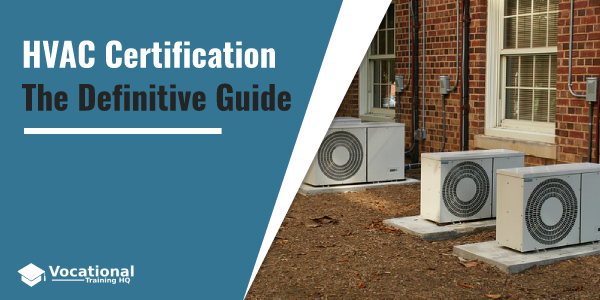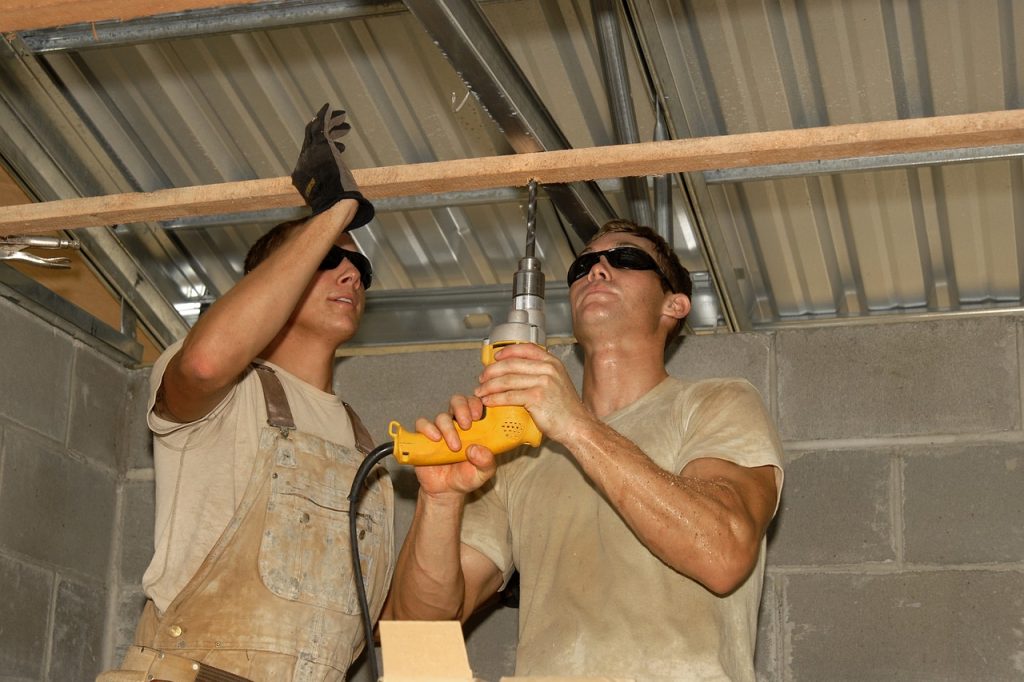
In the USA, there are about 400,000 people who work in the HVAC industry.
The point is that HVAC engineers and technicians are in great demand and it will continue to grow in the future.
The reason is the development of technologies that are used in the HVAC sphere.
In fact, it means that you need to upgrade your knowledge and skills constantly so you can meet the industry requirements.
To be able to get a better salary as well as career options, you need to obtain your certification.
Despite the fact it is not mandatory in every state, certification can provide you with some benefits as am HVAC technician.
In this article, we are going to tell you about the benefits of an HVAC technician career.
Also, there is info about the steps you need to follow if you want to get your certification.
Moreover, you can learn about training programs that will let you get certified and obtain better career prospects.
Article Table of Contents
- 1 What is an HVAC Certification License?
- 2 The Benefits of Becoming a Certified HVAC Technician
- 3 Working for Yourself as an HVAC Contractor
- 4 How to Become Certified – HVAC License Requirements
- 5 The Different Types of HVAC Certificates
- 6 HVAC Schools, Training Programs and Classes
- 7 Online Training Programs for HVAC Exams
- 8 The Costs of Becoming Certified
- 9 Next Steps
- 10 Frequently Asked Questions
- 10.1 What is the difference between HVAC and AC? Are there differences in training, work, and schooling?
- 10.2 What is the difference between HVAC and Refrigeration certification?
- 10.3 Do I need a Freon certification? Do I need a CFC certification?
- 10.4 What is a master HVAC license?
- 10.5 What is a journeyman HVAC license?
- 10.6 What is an HVAC engineer? Does an HVAC engineer require certification?
- 10.7 How much does an online certification cost?
- 10.8 What states do not require an HVAC license?
- 10.9 How much does an HVAC certification cost?
What is an HVAC Certification License?
HVAC certification proves the fact that a technician has all the required skills and knowledge to perform your job properly.
In order to get your certification, you need to pass a specialized exam.
As an HVAC professional, you can obtain one of three types of HVAC certification.
In some states, technicians should pass an exam to get their license and certification.
Also, there is a federal certification in the Code of Federal Regulations Section 608 of the Clean Air Act that is regulated by the government.
Penn Foster Career School
- Earn your career diploma and become an HVACR Technician in as little as 5 months;
- Learn online, at a pace that’s right for you;
- Affordable tuition with customized payment plans;
- Regionally and nationally accredited Career School.
In some states, you need to pass a certification test if you want to get your journeyman license.
Also, you can get your certification through the North American Technical Excellence (NATE).
One other organization that issues HVAC certifications is HVAC Excellence.
To be able to sit for the certification exam, you need to complete an accredited training program or an apprenticeship.
Also, you need to obtain a federal certification as an HVAC technician.
One other certification that is required is the one provided by the Environmental Protection Agency.
You need this one so you can purchase refrigerants and dispose of them.
Just keep in mind that skills and knowledge that are tested during the certification exam are essential for your future career.
The Benefits of Becoming a Certified HVAC Technician
So what are the reasons for obtaining an HVAC certification?
Here are some of the benefits of becoming certified:
- a competitive advantage over other HVAC technicians in the job market;
- higher earning potential as some organizations will pay certified technicians more;
- a growing number of bigger projects and demanding roles;
- possibility to start your own HVAC business faster and easier;
- ability to validate your knowledge as a technician, giving employers or clients peace of mind.
The HVAC industry develops fast attracting more and more people interested in it.
If you get certified, you can make sure that you’ll always have some great job prospects.
Below, you can find info about how you can get certified as well as about various types of certification.
Working for Yourself as an HVAC Contractor
If you want to work on your own or start a business and hire some employees, you should consider obtaining a contractor license.
You need to know that there are some states where only contractors need to have their licenses.
These specialists can supervise other HVAC technicians however in some states they need to hire so-called qualifiers who can perform supervision duties and have the required license.
If you have the required licensed employee, you can undertake HVAC work.
The qualifier will be responsible for the supervision of only the HVAC part of the work.

As a contractor, you need to have excellent knowledge in both HVAC and business.
Contractors need to run their own business performing such responsibilities as bookkeeping, paying payroll taxes, business licenses and a bunch of other duties.
In other words, you need to pass not only the HVAC exam but the business exam as well.
To get more info on the issue, you need to check your state requirements.
How to Become Certified – HVAC License Requirements
To get your HVAC certification, you need to:
- Earn a high school diploma or GED equivalent (depends on your state);
- Receive an HVAC certificate from an accredited trade school or program (depends on your state);
- Obtain your HVAC license from the state you plan on working in;
- Pass certification exams for different types of HVAC careers.
If you have enough experience and qualifications, you can get your certification easier.
Just keep in mind that you need to complete an apprenticeship to get your certification even if you have an associate’s degree or a certificate.
You need to know that there is a bunch of certification bodies in the country.
All of them require you to enroll in a training course.
It can be some self-education, apprenticeship, or an accredited program.
Just keep in mind that the content of a course depends on the type of certification you are pursuing.
To become certified, you need to pass successfully the exam.
Below, there is info about different types of HVAC certification.
The Different Types of HVAC Certificates
Among the available types of HVAC certifications, there are:
- First, EPA Type I Certification – For Servicing Small Appliances;
- EPA Type II Certification – For Servicing High-Pressure Systems;
- EPA Type III Certification – For Servicing Low-Pressure Systems;
- Universal EPA Certificate;
- North American Technician Excellence (NATE).
As was mentioned before, there are several types of HVAC certifications and you need to understand the difference between them.
Considering the fact each state has its own licensing requirements so it is important to know the difference between them.
You need to know that only one type of certificate is recognized all over the country.
Section 608 Technician Certification
This certification is also known as the EPA HVAC certification.
It is issued by the Environmental Protection Agency (EPA) and everyone who works with refrigerant gas (R22 or R410A) should have it.
HVAC technicians are obliged to work with these gases constantly so this certificate is mandatory for these specialists.
Under Section 608, there are 4 types of certificates each of which requires a training course as well as exam completion.
EPA Type I Certification – For Servicing Small Appliances
If you are going to work with small refrigerant-containing systems, you need to obtain the Type I certification.
The training course, as well as the exam, includes such subjects as:
- The definition of a small appliance, examples includes a small window AC unit, typically containing less than 5 kg of gas.
- System evacuation using the appropriate equipment.
- Gas recovery techniques for systems with or without a working compressor.
- Safety considerations when handling refrigerants.
To get this certification, you need to complete an approved test.
EPA Type II Certification – For Servicing High-Pressure Systems
To be able to perform any work related to high-pressure systems, you need to have the EPA Type II certificate.
In fact, to get this certification, you need to complete the same steps as for the previous option.
The subjects included in the test are:
- Detecting leaks in high-pressure systems.
- Why do you need to leak test before repair or system recharging.
- Leak repair requirements for systems containing more than 50 pounds of refrigerant.
- Recovery techniques and good practice.
- Recovery requirements for repairs, disposal, carrying out “major” repairs, etc.
- Understanding high-pressure refrigeration systems and gases.
- Safety and safe use of equipment.
After completing a self-study course, you should pass the certification test.
Attending some class training, you can achieve your certification study than with self-study training.
EPA Type III Certification – For Servicing Low-Pressure Systems
This type of certification includes the same subjects as the previous one but they are related to low-pressure systems.
If you know how to work with low-pressure systems, this certification is a great opportunity to refresh your knowledge.
To get this certification, you should pass the exam.
Universal EPA Certificate
This certificate covers all three types above and allows you to work with all three types of systems and can provide you with better career options.
To get this certification, you need more time as it covers more topics.
This certification will let you work in any state all over the country.
Just make sure you meet other state requirements.
North American Technician Excellence (NATE)
NATE – it is a non-profit organization that provides HVACR certification programs that are nationally recognized.
Of course, as an HVAC technician, you aren’t obliged to get certified however it will provide you with a bunch of benefits.
NATE is a practical certification so it is a perfect option for those who want to validate their knowledge.

There are two available types of the NATE exam – for experienced and newly-qualified technicians.
Each exam is based on your knowledge while taking your experience into account as well.
One other significant point is that this exam is divided into different specialties such as air conditioning, air distribution and gas furnaces.
NATE Entry Level & Early Career Certifications
If you’ve just entered the HVACR industry and worked hard to gain some experience, you still can get your certification from NATE.
There are two types of certification available for newly-qualified specialists:
- Ready-to-Work Certification Exam is a great option for those who’ve just entered the industry and had no formal training or educational background. Applying for this exam, the candidate needs to show their basic knowledge in HVAC systems including tools & equipment, heat transfer theory, electrical basics, and general safety. The exam contains 50 questions and you’ll get it after passing the exam successfully.
- HVAC Support Technician Certification Exam is for those who have 6-12 months of working experience. You can sit for it after completing some training. This exam covers more detail than the ready-to-work certificate. It includes such topics as installations, planned maintenance, system components, and design considerations. The test contains 100 questions.
NATE Professional Level Certifications
This certification exam is a great option for those who have at least one year of working experience.
The certification is divided into various sections including such aspects as:
- Air Conditioning (AC);
- Air Distribution (AD);
- Commercial Refrigeration (RC) (service only);
- Gas Heating (GS);
- HVAC Efficiency Analyst (Senior Level) (EA);
- Hydronics Gas (HG) (service only);
- Hydronics Oil (HO) (service only);
- Heat Pumps (Air-to-Air) (HP);
- Light Commercial Refrigeration (LC) (service only);
- Oil Heating (OL).
You need to know that some of these exams can be completed in Spanish.
If you pass various exams to get certified, it will allow you to get better career prospects and become a rounded expert.
HVAC Schools, Training Programs and Classes
To become a prospective HVAC technician, you need to complete a training program at a reputable trade school with an HVAC program.
During your training, you need to learn how to work with heating air conditioner systems.
During your training, you’ll be able to learn about the latest technologies in the sphere including reading wiring diagrams, analyzing defective equipment.
Also, you can learn about the safe replacement of fuses and breakers.
Moreover, schools offer courses on pipe fitting and electrician’s skills.
The curriculum is based on the International Mechanical Code, Code of Federal Regulations, and International Residential Code.
Students also learn about troubleshooting and identifying problems related to air conditioning and refrigeration units.
Moreover, students learn about refrigerants, their safety, units charging, and refrigerant recovering as well as dampers, duct, and furnaces.
Of course, you can get trained through the apprenticeship but two-year college training can provide you with knowledge on the latest technologies.
Also, college programs include such important aspects as physics, heating, and cooling principles.
One other important aspect is that these programs will let you obtain knowledge that is required for starting your own business.
You need to know that a college education can give you much more credibility than just an apprenticeship.
It is more likely that your clients will be more confident in your skills if you have a degree or a college certificate.
You need to know that your mentor’s reputation can be more questionable than the reputation of a college.
In other words, your diploma or certification can lend some more prestige to your qualification.
It means that you need to consider investing money into your college education to become an HVAC technician.
Online Training Programs for HVAC Exams
You need to know that it can be challenging to balance your training and work.
However, you need some training to get certified.
Of course, you can apply for a college training program or get your education from the comfort of your home.
It is up to you which option to choose but each of them has its advantages.

While studying at home, you can work at your own pace and decide when you are ready for the certification exam.
The point is that there is nothing or no one who can push you to enroll in the exam while you may delay this decision.
If you want to get your certification as fast as possible, the best option is to enroll in a training program that has a well-structured schedule.
Among the advantages of online training programs, there are:
- Learning materials are prepared for you;
- There is a structure to follow so going through the different learning modules is easier;
- On completion of the modules you are ready to book your test, there is a mechanism in place to ensure you sit the test;
- Practice test questions are provided to help you prepare for the main exam, as well as test your knowledge along the way.
Examples of online HVAC training programs and practice HVAC exams include:
- EPA 608 Practice Tests: We have created a complete EPA 608 study guide with various practice tests to help you prepare for the exam.
- HVAC Excellence – is a treasure trove of information about getting professional certification for different industry specialties.
- EPA Test Preparation – If you are preparing for the EPA Section 608 Technician Certification, the site offers some free software and other training resources to help you prepare for the exam.
The best route for you depends on your ability to learn new information and how fast you want to get certified.
To get ready for the exam, you can apply for an HVAC online training program or evening classes.
The Costs of Becoming Certified
The cost of your HVAC training may vary significantly from $1 500 to $30 000 and depends on your location.
Each state has its own cost rates for HVAC training programs.
Also, you need to know that tuitions at community colleges are significantly lower than in universities that offer four-year courses for HVAC technicians.

Also, the cost of your training will depend on the length of the course.
There are programs that last for 9 months as well as those that last for two years or more and lead to an associate’s degree.
Also, you need to pay some additional fees for your certification exam.
In some states, these fees can be pretty low but in others, they are significantly higher.
Next Steps
Now, when you read this article, you know why it is important to get certified if you want to succeed in HVAC.
As it was mentioned before, most employers give preference to certified HVAC specialists.
You’ve learned about various types of certification as well as the necessity to obtain it.
Also, you’ve learned about some important aspects related to getting ready for the certification.
It is up to you which route to choose and how to get certified.
You just need to keep in mind that the certification can significantly advance your career options.
Frequently Asked Questions
What is the difference between HVAC and AC? Are there differences in training, work, and schooling?
While AC stands out for air conditioning only, HVAC covers more systems and includes heating, cooling, and air conditioning.
Both of them are related to systems that regulate indoor temperature.
Sometimes, these abbreviations can be interchangeable.
What is the difference between HVAC and Refrigeration certification?
You need to know, that each state has its own requirements and regulations when it comes to HVAC certification.
In some states, you need to obtain a separate certification for HVAC and refrigerant.
Also, the type of certification depends on the size of the systems you are going to work with.
Moreover, you need to know that there is a difference between “refrigeration” certification and “refrigerant” certification.
The first one is related to AC systems and equipment that use refrigerants.
Do I need a Freon certification? Do I need a CFC certification?
Freon – is a type of an aerosol that contains at least one CFC (chlorofluorocarbons).
You need to know that these substances have a harmful effect on the environment.
To be able to work with them or sell them, you need to have a certification.
What is a master HVAC license?
In some states, traditional qualification levels for trade professions are used.
The highest level is a master and the requirements for it vary from one state to another.
For example, in some states, only masters can be apprentice’s supervisors.
Also, it can be a part of a contractor’s certification.
It is the next level after a journeyman certification.
Just make sure to check the requirements in your area.
What is a journeyman HVAC license?
A journeyman is one other traditional certification level applied for trade professionals.
Usually, these specialists may work without supervision depending on the state.
To become a journeyman you need to complete an apprenticeship and they usually can supervise apprentices.
What is an HVAC engineer? Does an HVAC engineer require certification?
HVAC engineers are responsible for designing different systems and equipment.
These professionals are problem solvers that may work in labs or cooperate with architects and other engineers.
In some states, HVAC engineers need to have a certification and at least a bachelor’s degree.
How much does an online certification cost?
Usually, to be able to get your HVAC license, you need to sit for an in-person proctored exam.
The EPA Section 608 Type 1 may cost about $20-40 but it may vary depending on the state.
What states do not require an HVAC license?
You need to keep in mind that state laws change often so you need to check the requirements constantly.
Also, some counties and cities may have their own requirements.
The license isn’t required in some states such as:
- Colorado;
- Illinois;
- Indiana;
- Kansas;
- Massachusetts;
- Maine;
- Minnesota;
- Missouri;
- Montana;
- New Hampshire;
- New York;
- South Dakota;
- Vermont;
- Wisconsin;
- Wyoming.
How much does an HVAC certification cost?
Each state has its own regulations and requirements for HVAC State certification or licensing.
The price and term of licensing also depend on the state.
In fact, the price may vary between $50 and $300 while terms can be about 2-3 years.
EPA Section 608 certification prices also depend on the organization that administrates it.
An average price for a Type 1 exam is about $20 while a Universal exam costs about $150.
Read the full guide: How to Become an HVAC Technician